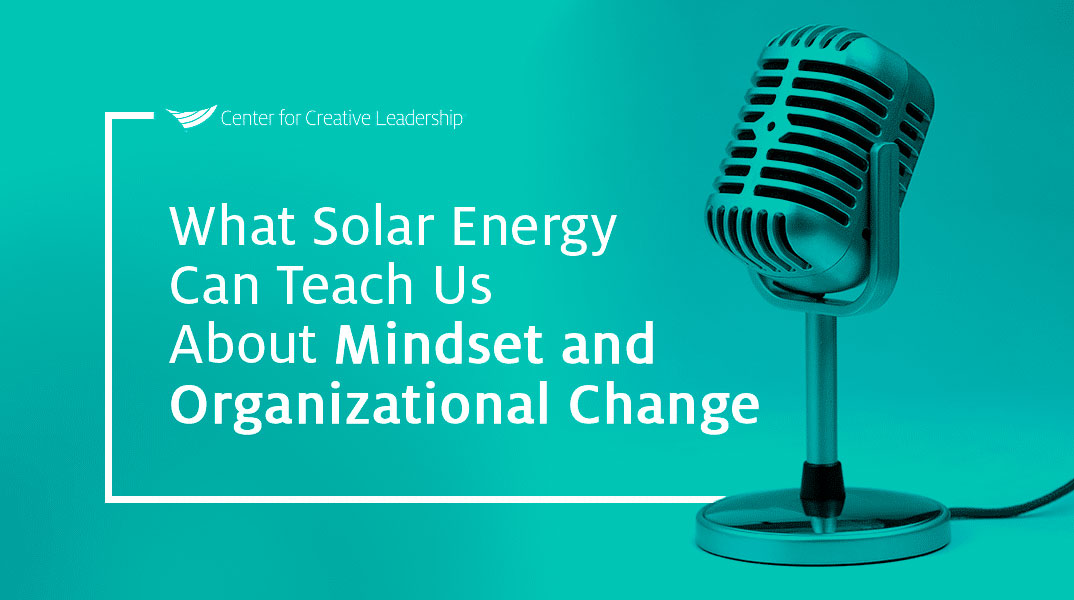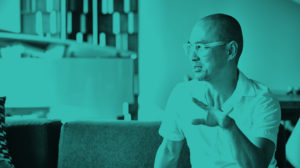- PODCAST
Lead With That: What Solar Energy Can Teach Us About Mindset and Organizational Change

In this episode of Lead With That, Ren and Allison investigate what we can learn about how people and organizations react to change by taking a look at the solar energy industry.
Solar is officially the cheapest energy in history. According to the International Energy Agency, solar is 20-50% cheaper than traditional energy sources.
As solar becomes a profitable way to save our planet, it might seem to be the renewable energy of choice. The statistic “20 to 50 percent cheaper” is actually based on a calculus of companies building solar projects, not something that actually translates for consumers or even solar homeowners. All the same, With the new, lowered cost of capital, solar energy’s cost per megawatt has fallen almost completely below both gas and coal worldwide.
So why aren’t we making solar the primary source of energy? As you might imagine, the answer to this is complex and simple, but fortunately for us offers some great insights into why change, both at an individual and organizational level, is more difficult than you might think. Let’s talk about why, despite its merits, people are resistant to adopting solar energy and lead with that.
Listen now or read the full transcript below.
Listen to the Podcast
In this episode, Ren and Allison investigate what we can learn about how people and organizations react to change by taking a look at the solar energy industry.
Interview Transcript
INTRO:
Welcome back to the CCL Podcast, Lead With That. We talk current events and pop culture, to look at where leadership is happening and what’s happening with leadership. Solar is officially the cheapest energy in history. According to the international energy agency, solar is 20-50% cheaper than traditional energy sources. And as solar becomes a profitable way to save our planet, it might seem to be the renewable energy of choice.
Ren Washington:
However, the statistic of 20-50% cheaper was actually based on a calculus of companies building solar projects, not necessarily something that actually translates for consumers, or even solar homeowners. All the same with the new lowered cost of capital, solar’s cost per megawatt has fallen almost completely below both gas and coal worldwide.
So, we’ll just go ahead and make solar the primary source of energy, right? Shut down the coal and gas factories and put panels on my roof. We did it. Or did we? I’m Ren Washington, one of the trainers here at the center and as usual, I’m joined with my cohost and one of my training colleagues, Alison Barr. Alison, how are you doing today?
Alison Barr:
Happy Thanksgiving week. I’m good. Just as you were speaking right there, you reminded me of a time when I was in high school and this very sweet high school friend of mine used to go door to door to try to sell green energy. And how far we’ve come. You just reminded me of Bill. Good old Bill.
Ren Washington:
Bill. What was Bill slinging?
Alison Barr:
He was slinging light bulbs. Do you remember when the light bulbs were… There was, I don’t remember the brand, but somehow they were more energy efficient and they lasted four years instead of, however long they last currently. But he was slinging light bulbs. That was his high school side hustle.
Ren Washington:
That’s funny. He’s on the front wave of the led movement.
Alison Barr:
Exactly. Did you ever have anyone come door to door for you trying to sell you some environmental friendly product?
Ren Washington:
Maybe an environmentally friendly product. I sold knives once upon a time. Cutco. Do you ever sell Cutco knives?
Alison Barr:
No. No. But I know some people who did. Yep.
Ren Washington:
Yeah. I bet. I feel like everyone does. I feel like if you’re listening right now, there’s a good chance you sold knives. But I mean, it was environmentally friendly in so far that the knives were supposed to be good forever and they would sharpen themselves. So, you wouldn’t have to mind new metals. But I can’t say that anyone has ever come by selling environmentally friendly wares.
Alison Barr:
Yeah. I mean, it got me thinking, we talked last week about solar and renewable energy and sustainability. And it got me thinking about all of the trends and all of the products that exist that are aiming to be more sustainable. And it was really interesting to read about solar energy and specifically the solar panels, and there’s a lot of debate in the environmental world right now because solar panels, they’re incredible in terms of being clean and renewable.
Alison Barr:
And for the costs that you just mentioned, however, there’s, of course, a few downsides as there’s no perfect energy source. And it got me thinking about change, and got me thinking about why people would be hesitant to go that route. Why organizations might be hesitant to go that route. And it got me thinking about major change in organizations. There’s always going to be some costs, however, ideally in the long-term the benefits usually outweigh the risk.
Ren Washington:
Well, it’s interesting because I’m actually looking at some solar panels that I have right now. Now, let’s not get too heady about it. They’re tiny panels for some strung lights that I did. And it’s interesting, it’s a power source, but it’s also an ease thing. I don’t have to turn the lights on or off. I guess I could get on with a timer, but when the sun goes down, the lights come on. And it’s funny for me to look at these panels and think about, “Look. I can harness solar energy too.”
Ren Washington:
And then, I mean, what does that look like for how we can harness movements in organizations, especially when we talk about change, and solar, and what this all means today. Do you have solar panels? Or do you use solar energy in your life?
Alison Barr:
No. It’s so interesting. When we got off the call last week after we were talking about it, that evening I went on to Instagram as I do. I like social media. And a friend of mine, she lives in the Vail Valley, had posted that her and her husband just put solar panels on their home. And they have such a high upfront cost, and I think that’s why a lot of people haven’t gone that route yet, because upfront, their cost is high, but in the longterm you end up saving money.
Alison Barr:
So, no. We haven’t gone that route just yet in Colorado. It seems like a smart thing to do since we get so much sunshine.
Ren Washington:
I remember I used to work on the north side of town and in Colorado Springs, and out by the air force academy, there is a solar farm. There’s this paneled area, this long swath where there’s all this open space and in the panel shift as the sunlight moves, which by the way, my tiny panels don’t, they’re analog shifts. I have to go out there and move them if I want them to catch the best sun throughout, but it was just an interesting idea. And you would think in a place that gets 300 days of sunlight, then why wouldn’t you try to harness that.
But maybe that’s some of our conversation that we get to have today around, what’s getting in the way of people taking advantage of seemingly, low hanging fruit? Or easy things? Especially as it relates to what we do. And what stops leaders from succeeding in moving changes through an organization when the benefits seem obvious? Or maybe the upfront cost is prohibitive?
Alison Barr:
Yeah. I mean, I’d love to know what you think. And of course, sometimes I think leaders and those who are selling a product even have a struggle describing the long-term benefit, and with a product like solar panels, it seems easy from my perspective to get people bought-into that product. You get them emotionally bought-in, you’re saving the environment.
It’s not that hard to convince people to invest in the world and in the environment. However, when you start to address those small, maybe adjustments that might be needed, the cost, the behavioral change, it starts to have some different responses. So, I’m curious to know what you think about that.
Ren Washington:
I couldn’t help, but smile because I might think that it is really hard to have people recognize this world saving thing. And I guess I know that you have some info about how world saving is solar anyway. But, when we were digging into this and having some reflections, and I was thinking, “What does this represent for people who have to manage teams, or lead changes?”
And I started digging around and got into this idea of present bias. The psychological notion that, humans are much more likely to focus on the present for that immediate gratification, or that present here and now experience of joy, or happiness, as opposed to looking forward, even when they know that if they save, or they don’t give themselves some pleasure now, that could get even more later.
But we just have a natural bias towards our present state. And so, that’s just one of the things I think what makes change and influence so hard is, how do I tell you Alison, change what you’re doing today for something that you might not actually experience the benefits from? I mean, did you know the first solar panel was created in 1883?
Alison Barr:
I did not. I did not know that.
Ren Washington:
Yeah. A hundreds year old technology where people were looking at the sun and saying, “Wait a minute, this power is life on the planet, could it power electricity?” Now, granted the first panels were highly cost prohibited and weren’t producing that much energy, but for a science that has been around that long, it’s curious about, why people haven’t adopted it? And what are the reasons why? And what is leadership’s role in helping people adopt it?
Alison Barr:
Yeah. It sounds like you’re almost saying that you’ve got to convince people that there’s something wrong right now, or there’s something prohibiting us from being as great as we could be now in order to get bought-in, because I’m so present to what’s happening in this moment.
Ren Washington:
Yeah. And even more than… I don’t know if you can do that with people. I really wonder if I’m ever going to move the dial, or if I want to move and impact a change for long periods of time, how do I start with your Tuesday afternoon? What are you going to do tomorrow that’s going to benefit me? That’s the question that has to be answered. And I think present bias really talks about that.
And then, when I look at solar energy and think about a science that’s been around for over a hundred years, and now, just now, is becoming a viable idea. It’s now cost effective to save our planet. Not cost effective, but you can actually make money. So, that’s how I can get people bought-in. “Hey, your pockets can be made thicker if you engage in solar. So come on board.”
Alison Barr:
Yeah. And that goes on both sides, too. The person who is purchasing solar will save money in the long run. So, you could argue that on both sides of the coin. That the distributors also making money, but you as the consumer, will save money on the long run too.
Ren Washington:
Well, do you have a washer and dryer in your home? Clothes washer and dryer? Not to get too personal.
Alison Barr:
I do. Yes.
Ren Washington:
And when you bought it, did you read the wattage information on it that said, “If you buy this, it might be more expensive now, but it will save you in the long run for energy.”
Alison Barr:
No. I mean, when we bought our house, it came with the house. Neither one of us thought twice about it, to be honest.
Ren Washington:
Right. I think that’s an interesting microcosm of our present bias. The idea of, “If it ain’t broke, don’t fix it.” I mean, colloquialisms exists for a reason. And when I’m looking at people, I’m saying, “Look. Change. If you change, it will benefit you.” And people go, “Yeah. But change stinks. I don’t like change.”
And it’s so interesting when we work with clients and people that talk about this, I think it’s the biggest false paradigm in the world. Well, geez. One of the biggest false paradigms in the world is, “People don’t like change.” Alison, if I were to give you a thousand dollars, no strings attached right now, would you say, “Yes?”
Alison Barr:
To you giving me a thousand dollars?
Ren Washington:
Yeah.
Alison Barr:
Yeah. Abso… Yes. I might ask you what the catch is.
Ren Washington:
Right. Well, no strings attached. No strings attached at all. Just money in your pocket.
Alison Barr:
Yes. I would take that.
Ren Washington:
Yes. You’d take that. And I have yet to meet someone who said, “No,” to me around that. And then if you think about it, is a thousand dollars more in your pocket a change?
Alison Barr:
Is it a change? No, it’s not really.
Ren Washington:
That’s not a change in your life? You already have a thousand dollars in your pocket?
Alison Barr:
Well, I mean, it’s a small change is what I mean. You’re putting money in my pocket, but I don’t have to do anything differently.
Ren Washington:
Oh, see. Now that’s an interesting thing. Maybe that’s another topic around, do you have to change for that change? But it isn’t when I ask people that, I mean, if you have a thousand more in five minutes than you did right now, that would be a change in your circumstances. And generally when I talk to people, that’s change they can get behind.
Alison Barr:
Correct.
Ren Washington:
And it’s not so much that people don’t like change, but people don’t like is change that they can’t control, or change that impacts them negatively. People are looking to minimize pain and maximize pleasure. Generally, that’s a human prerogative.
Now, we can talk about how that actually is made manifest in the things that we do every day, but it keeps getting me thinking about this idea of solar energy. And what’s the tension between, if we have renewable energy that can keep your parents, or rather your children’s children alive, and you can support generations to come get on board.
And I look at that and it looks so far in the future that I can’t really see it. Not nearly as far as what I can see in front of me, and it reminds me of the Immunity To Change research. Are you familiar with the Immunity To Change research?
Alison Barr:
Vaguely. I’d love to hear more about it.
Ren Washington:
I mean, it’s a really interesting bit of work, by Robert Kegan and Lisa Lahey, where they were looking at this tension between, why can’t people change. And there’s this interesting piece of data that they were able to come upon. They were saying that seriously ill patients with heart issues, they’ve been told in order for you to stay alive, you got to change your diet, you got to exercise more, you got to stop smoking, what have you.
I mean, people on the precipice of catastrophic health failure are told this, and only one out of seven people succeed in doing that. I mean, you’re on the brink of disaster, all of the signs are pointing to you and it says, “Hey, change this behavior and you’ll save your life.” And only one in seven people are able to find success. And it’s interesting because, we as people, we appreciate the change at a cognitive level. We see the value.
I mean, when you look at the Exxon Valdez, or when you look at the deep water horizon and you see oil pumping into the ocean, no one’s going to stand there and look at that and say, “Well, that’s great. I’m excited for the birds and sea life who’s going to be covered in oil.” And I understand that that’s… No one’s looking at that going, “Yay, hooray.”
We understand that there’s a damage there, but there’s something that holds us back from our old habits. And so, the Immunity Change stuff says, “Obviously, if we cannot change even to save our own lives, then we need to do a deeper approach than just a behavioral approach.” And it’s this idea of shifting mindsets. About digging into our own self expiration, to explore our own willingness, to change. To identify our patterns through a new lens.
I mean, do you have any habits that you have yet to break in your life that you wish you could?
Alison Barr:
I might be one of those outliers, Ren, who appreciates change. My worst nightmare is to do the same thing every day. But yeah. I mean, I can think back to habits of when I was in college, for example, you’re not going to convince me to not go out. You’re not going to convince me that operating on little sleep is a bad idea until, I start to see some horribly negative impacts from it. And then, I changed. But gosh. I think something that I’m trying to curb, I suppose a little bit right now is the caffeine intake.
Ren Washington:
Yeah. I’m not changing that. I have an immunity to that change. I am the coffee drinker. Well, it’s funny, when you talk about, “Until I see some negative impact.” And even that, data shows it, even that doesn’t help people change. And so, what’s a bigger impact than using a renewable source, like the most powerful star that we can… Or that we’re close to the solar energy that exists that we could harness. And that, absolutely is renewable.
And in the very worst case, even if the sun stops pumping out heat, the way that light travels, we’re going to at least have heat for another eight minutes. So, someone might look at that and go, “Well, maybe we can find a fix in eight minutes.” And so, it’s just so interesting for me to think about as a leader, how do you really get people to change when the writing’s on the wall and no one’s willing to read it?
It reminds me of this phrase that, “A few things are harder to see, than the wall right in front of you.” And I think it speaks to this idea of, we build the confines of our own world. We create these structures that, instead of pushing us forward, it hold us back. And we don’t realize what we’re bumping into.
And so, solar power, first panel created in 1883, the first US patents created five years later is just now, becoming really important. And when I think about, maybe eight years ago, there was a push for solar energy, and it was incredibly cost prohibitive, and we put our eggs in a few solar company buckets, and it didn’t really work. And now, people point to that in an effort maybe to confirm their own biases and say, “Look. See, I told you it wouldn’t work. It’s not worth it now.”
And now, we realize that, if I can convince you that you can make money today by saving the planet, that’s the value proposition. Saving the planet it’s not enough of a value proposition. But giving you an opportunity to put more money in your bank account, is the value proposition. I mean, what do you think, does that hold water for you?
Alison Barr:
I think it’s both for me. I keep thinking about, why I’m bought-in? I’m already bought-in. You wouldn’t need to convince me the reason that we haven’t gone there is from a financial perspective. So part of that is why we haven’t. And then, the other part, I’m already bought-in, because my emotions are bought-in. And how did my emotions get bought-in? Mostly for me, it’s because of the imagery it’s popular now.
And I think about Netflix, everything that’s on Netflix right now, all of these documentaries about what’s going to happen in 10 years if we don’t start. It almost feels for me, now that I’m reflecting on it, as I’ve been scared a little bit into thinking bigger, into thinking about the future and hearing these messages about, “Do you want your niece to be in the environment that you’re in now where she can breathe clean air?” “And of course I do.” So, it almost has been messaged to me in a way where it’s almost fear-based.
Ren Washington:
You’re bought-in, though?
Alison Barr:
Oh yeah. I’m bought-in that it’s a good idea. Yes.
Ren Washington:
How do we get the people who are bought-in, and who aren’t? Who don’t think it’s a good idea? Who aren’t already on the bandwagon?
Alison Barr:
I think probably there’s not a whole lot of information that’s been popularized, yet, and when I looked at this… I looked at a consumer report and I found this consumer report that was based in the United States, of course. So, this is specific to the US and part of the reasons, the top few reasons that people haven’t bought-into were, one, financial. We’ve already talked about that. So, it’s high upfront costs. And then. the top two most frequently asked questions, do you want to guess what one of them was? You already alluded to it.
Ren Washington:
About solar panel?
Alison Barr:
Yeah.
Ren Washington:
How much money is it going to save me, and what’s it going to do to my house?
Alison Barr:
Yeah. Exactly. So, what’s it going to be to my house? What happens when they need to be replaced? And the third one is, what happens at night time. And so, I think there’s just not enough information that’s been popularized for people to be fully bought-in. And then there’s the cost, of course. But you already mentioned this before, too. Solar panels, they have a high upfront cost and then long-term, scientists say that, they are going to save everybody in the long run, whether it’s financially, or from an environmental perspective.
However, some people argue that the glass in them, it’s not recyclable. So there’s one flaw. And then, the manufacturing has some environmental impact. So, there’s another flaw. So, it’s almost that we have to convince people that the long-term impact outweighs the current risk. And again, there’s no perfect, environmentally friendly, perfect way to source energy. So we’re doing the best that we can right now.
And I think that about businesses too. They parallel. Those reasons parallel common resistance behaviors that we experienced and we see an organizational change as well.
Ren Washington:
Yeah. That makes me think of a few questions. I mean, I really want to hear more about the idea that there is no, truly sustainable renewable source of energy. But from a leadership perspective, when we’re doing that cost benefit analysis of the here and now, and the then, I don’t know if there’s ever enough, in my experiences and using solar as an example.
If there’s ever enough information to future casts where you can convince someone who’s not already convinced, how do you move an entrenched idea that it doesn’t matter what happens in 30 years? In business, if we don’t solve for this quarter, we won’t be around next year?
Alison Barr:
Right.
Ren Washington:
I mean, personally I have experienced that, very recently, where we don’t have the luxury to dream big. We got to dream now.
Alison Barr:
Right. And I think what normally happens when a change is initiated, whether it’s in a response to crisis, or, I don’t know, one of the most common changes in an organization might be an update in technology. There’s some other softer ones, leadership changes, culture changes, but right now, you alluded to us being in a time of crisis, and what normally happens, is that organizations neglect to consider that it’s the transition that people are wary of. It’s not the change itself necessarily.
And we have to remember that it takes time to adjust to change in new ways of behaving. And solar panels, for example, take three months from installation to be fully running on solar power. So, there’s a transition there, too. And it’s the adjustment time to major change in the workplace. And that transition time is vital to people becoming bought-in, so to speak.
Ren Washington:
Yeah. The cultural push for instant gratification.
Alison Barr:
Right.
Ren Washington:
I wasn’t going to say Western, and I don’t know if it’s uniquely American, but it is certainly American, “Give it to me now. What do you mean wait for three months? I just put the panels on, shouldn’t it be paying dividends today?” What do you think?
Alison Barr:
I’m guilty. I’m certainly guilty of that. And if we look at the big picture, I think that we forget sometimes that employees at the workplace are human beings and we expect humans at the workplace to be a little bit more adaptable, if not more adaptable. And what science will tell us is that, “Human behavior in the face of any change, it’s predictable.” It’s always going to be predictable. We’re hardwired to resist it.
Alison Barr:
Part of the brain, the amygdala, interprets change as a threat. No matter what. So, it’s going to release that cortisol in response to stress and our bodies are literally protecting us from change, unless we have information upfront. So, in the face of change, humans are also at risk of cognitive dissonance. And when our actions are misaligned with our values, we resist. So, I think there’s good news for organizations trying to implement change.
If we can address both the skills needed for the transition, not the change, but the transition and what’s going to take to sustain it, and also, add on top of that, the value, or the why, behind the change, we can get ahead of those stress hormones, the cognitive dissonance, and get ahead of those responses.
So, what do you think, Ren, if we were to tell you all the information that you could possibly need to adjust to a major transition at the workplace, and why we’re doing it in the first place, do you think you would adjust a little bit better?
Ren Washington:
No.
Alison Barr:
Why not?
Ren Washington:
I love your chain and transition idea, and I think it’s one of those things where we talk to the leaders, and I think it’s pretty impactful. The change is easy, transition is hard. I think change is the memo. Change is the note from the CEO saying, “We’re doing this,” and then, you got to deal with it. And my favorite metaphor for that is, a marriage and a wedding.
A wedding is the change, marriage is the transition. And imagine if people put all the time and effort that they do planning their wedding, that same planning and thoughtfulness into their marriages. I mean, what marriage wouldn’t be more successful? I don’t know. But, but back to your question, if you gave me all the information upfront, would I be that much more apt, or likely to stick with the transition? And I think two things, paralysis by analysis, and what does then have to do with my now.
And so, sometimes I know people see the whole… I worked with this woman once and we were having a conversation about leadership communication and she said, “It’s hard for me to take the first step if I can’t see the whole stairwell.” And I thought, “Wow, cool metaphor for vision.” If I can’t see where we’re ending, how do I take the first step? But for me, I started stewing on it, internalizing, and I thought, “Personally for me though, sometimes it’s hard for me to take the first step when I can see the whole stairwell.”
I look at the whole stairwell and I go, “Oh my gosh. That’s a lot of steps to take. That’s a really long journey. What if I just didn’t do the journey and I stood right here? At least I’d be cozy. At least I know what I have in for me.” So, how do you subvert me? How do you move my tendencies? And I do this for a living.
Alison Barr:
Right. Which proves the point even further, that humans are predictable. There’s always going to be resistance to change. And depending on the organization, you have to provide enough data, enough information, to the general response while leaving room for the people who are going to have a harder time. I even think back to moving offices, this was prior to CCL. I remember my boss saying, “We’re moving offices.” And when I tell you that it took six weeks, or more for a team of 12 to be on board with that, I am telling you the truth. Because people didn’t understand, why. The why wasn’t provided for us.
And I think you can get ahead of that predictable response to change by sharing more information than we think we should, and by sharing that purposeful and thoughtful, why, behind it. People need to know. Humans need to understand their role in change and believe that it’s worthwhile for them to play a part.
So, while, Ren, your response might be different to mine, I think by providing a broad brush of information and then saying, “Should anyone want to dive deeper into these? Here are my office hours. Let’s sit down and do it.” It’s that whole concept of slowing down to speed up, which is overplayed. But if you really think about it, how much time will you save on the backend if you address those conversations upfront and have a trusting enough work environment that you can say it, “I’m not comfortable with this and here’s why.” And have a dialogue about it.
Ren Washington:
Well, I can firsthand tell you that, when I was in CCL, and we were still working in person before the COVID, as it were, they dare say, “Ren, you want to move offices?” And I said, “No.” To your point, maybe there wasn’t enough why, but I was apprehensive for whatever reasons. And I didn’t give it the time or energy to dig into the psychology of why I didn’t want to move. I just knew I didn’t want to move.
Alison Barr:
Right. And I’m wondering though, and sometimes we’re not given a choice. So had it been framed different like, “Ren, we’re doing a reorganization of people’s offices. You’re moving. You’re moving.” Then I wonder what your response would have been.
Ren Washington:
There was a long-held rumor that I’ve only been able to partially validate. That most of the clean energy patents of cheap cost effective sustainable renewable energy, are currently held in the hands of big unsustainable organizations. Sustainables that rely on fossil fuels, that rely on natural gas. The idea that there’s no money in the cure. There’s just money’s providing solutions for the symptom.
And so, I think you bring up an interesting point as I reflect on my earlier thought around, “People don’t like change,” is not really the case. It’s people like change that benefits them, and that enables them an opportunity to continue to do things they enjoy, that they value, and that moves them from a negative situation.
And so, how do I tell someone that, your life of comfort and ease is actually uncomfortable for people that don’t even exist anymore? Is there an answer to that question? Is the, why, enough to convince me that my children’s children are going to benefit from my decisions today? Even if I can’t even fathom them?
Alison Barr:
Yeah. I think if you’re talking about the solar, if we’re going back to solar, gosh, you get me thinking about marketing and marketing techniques. And modern day marketing right now, says to appeal to people’s emotions. It appeals to people’s emotions, knowing that some of us will have different responses. There are going to people who won’t buy into it, but the vast majority of people are run by their emotions.
We make decisions based off of how we feel. And I do think there’s value in approaching a major change from that perspective. And I’m not saying, “Ren, how do you feel? Let’s talk about how you feel.” That’s not what I’m saying. But what I am saying is, limiting, or getting ahead of inevitable obstacles and frustrations that if we don’t, we’ll get even bigger and more magnified in the long runs.
So, with solar, what will happen in the long run if we don’t start going this route? And I don’t have children, and I don’t plan on having children. But you’re still going to get me if you start to talk about little kids. You will in the same way that in the workplace, because I value my work, if we don’t get ahead of these changes, the obstacles will get much bigger, and the frustrations and your work will be harder in the long run.
While that doesn’t sound emotional, it is. Because it’s stressful. Obstacles are stressful. So, most people will have a different emotional response to change, but the point is you will have an emotional response. That’s inevitable.
Ren Washington:
Your comment about marketing makes me think of diamonds. Which by most considerations, diamonds are actually semiprecious at best. Once before, when diamonds were rare, they were considered a precious stone, but now diamonds really aren’t that rare. But they’ve maintained an image of their precious nature because of concerted and focused energies of two organizations.
The diamonds have very interesting history, but part of it is this concerted effort to convince primarily, Americans for many generations, that diamonds were the best and only way to articulate your undying love for someone. And so, then I think about, well, solar needs a better marketing team. Because, I mean, we’re American muscle. We like cars that go fast and make loud, loud noises. There was a movie with Adam Sandler, no, no, with Vince Vaughn and Kevin James. I can’t remember the title. Maybe it’s called, The Affair, or something like that.
But anyway, the characters, they were making an engine, an electric engine, that would give the same combustion sound as traditional combustion engines. That roar you hear when you step on a V8, that grumble, and they were trying to make that sound happen for electric cars, as opposed to that soft ham you hear when an electric car drives past you. They wanted to capture that.
And I think it comes to that idea of, how can you help people see themselves in the here and now in the future that they’re going to create. And so, maybe the solar is, how can I spice it up to let people know that, if you do this, your life won’t change. Maybe that’s what goes back to the earlier thing that I said, “Let me give you a thousand dollars. Is that change?” And you go, “Well, no. I didn’t have to change.” And so. I wonder, is that the sweet spot? How can I get you to change without having to change? Is that possible?
Alison Barr:
Yeah. And I think it’s… Well, I don’t think it’s possible, but I think you can nourish an environment if we take it back to the organization. You can nourish an environment in which transitions become smoother. And you can do that in a couple of different ways. I’m talking about the workplace right now. But leaders can do this by taking time to really provide a thoughtful, and descriptive, and detailed, why.
Why are we doing this? When people lack that information, like I mentioned before, they risk being in cognitive dissonance. They’re automatically stressed. They might not even know it. And when we don’t explain why it’s worthwhile for people to play a part in that change, we risk turnover. There’s a lot of risk. We risk decreased performance, because people are under stress. We actually lose money as a company, if we don’t fully prepare people.
So, contributions and change need to make sense to people at the individual level. And from a solar level, I think there’s not enough thoughtful and detailed descriptive why. In marketing, I think you’re right. I think, I haven’t seen any powerful marketing. I actually didn’t even know that it is the most affordable right now until you mentioned that when we were talking last week. I didn’t know that.
So, if you’re appealing to people’s pocketbooks, why are we not saying that? And we’re also appealing to people’s emotions, why is there not a more charged vision out there? I’m not sure. I’m not in that business. But I think if there was, it would help with that transition to get ahead of those inevitable obstacles and frustrations that come with a major change.
Ren Washington:
Yeah. I think about the war chest that’s made available to the fossil fuel energy. I don’t know, do you remember a little bit ago Exxon was pushing their chlorophyll, or something like that? Their alternative energy initiative where they’re using algae is the new frontier of energy. And it’s interesting when I think about the branding of “the energy” division. And for those of you who can’t see me, I’m air quoting “the energy.” We work with a lot of energy companies. And what I really mean is, I don’t mean solar energy. I don’t mean wind energy. I mean, fossil fuels. It’s oil and gas industry, but they’ve done a good job of changing the focus.
And so, zooming back a little bit and focusing back on solar is, now that we can make money doing it, maybe there’ll be enough money in that to change mindsets. Or maybe to fund a campaign that successfully articulates, the why.
Alison Barr:
I’d be so curious to hear from our viewers because you’re thinking, or listeners rather. You’re getting me to think about two things, which is people’s money, which can be very emotionally charged. And purpose in the same conversation. And so, I do believe though, when people can bring their work or the change back to a purpose, they’re more likely to buy-in, they’re more likely to overcome obstacles and sustain the change.
So, where I go, is sustaining change. So many organizations will initiate a change and it’s so hard to sustain it. And I think being transparent about the transition ahead of time and acknowledging that it’s going to come with some obstacles, we’ll support in people buying into and getting answers to those questions ahead of time, that would otherwise cause some stress and resistance. And if we consider Simon Sinex point of view, which is, “People are going to buy into why you do it, versus what you do.”
And his argument is, that why, is going to sustain organizational change. Or will sustain the product, so to speak. Apple’s a good example. And I personally think providing more information than you think is needed for people, and providing the why, is going to give them a glimpse into the vision that you mentioned. What it’s going to look like if, when the change is embraced and executed.
If we buy into that, here’s what it’s going to look like. Giving people something to look forward to in that why, and in that vision. So, you brought up apple as well, which is an expensive product. Just like a solar. Solar panels are expensive from the get-go. And I’ve had my Mac for, gosh, I think I bought it in 2011, and I still have it and it’s still running well.
So, it’s a different conversation because it’s not environmentally friendly necessarily, but the point is, the why, behind that product, the why, that I bought-into, was in the long run, it’s going to cost me so much less because it’s not going to have bugs. It’s not going to get viruses knocking on wood. It hasn’t.
And so, buy the same token, solar panels in the long run, save us more. So, they’re an investment. And I think in organizations, we need to do the same thing. Present them as an investment. An investment to our vision, an investment to our future. And then, people won’t have to guess. They’re going to know that they have something to look forward to and that it might come with some obstacles, but in the long run, it’s going to save them.
Ren Washington:
Yeah. And maybe that’s for our next podcast when we get to dig into the giant apple machine. But, I appreciate that perspective. And it makes me think as a major takeaway for someone who’s in a position to lead teams, or to lead change. Looking at solar and it’s example and exploring things like that, it brings me back to this idea again that, present bias is, and it’s not something that needs to be ignored nor run away from.
I think a part of the issue that I said in the Immunity to Change is, a solution to changing mindsets is exploring current patterns and being willing to engage in that self-inquiry. And so, if I’m leading change, I promise it’s not as fatalist as it sounds. I do believe that you can move the dial. I mean, you can change small habits to make a big difference.
And I really believe, as you start changing the way you do things and the people around you, that it can start to echo through. And so, honoring present bias and having people explore, what is your bias to the present moments? And why? That’s how you can leverage that for success.
Exploring why, people, back to your why, about what it is that they like in their present bias is the opportunity to say, “Okay. If in this future change, you will get this.” “What is your present bias around traditional energy?” “Well my father works in a coal plant. I’ve got a Dodge Charger out in the driveway, and I love my gas burning stove.” “Well, then how can I take that and say, you can get some of those same things, or something like it, from solar.” And I think that kind of tackling of any change, or finding success and influence using that form, might be the sweet spot for digging in.
Alison Barr:
Yeah. That’s interesting. As I reflect on being in the workplace for however many years I’ve been working, I don’t know that I’ve ever been asked one time just upfront like that. “What’s your resistant? What’s your bias. Let’s talk about it and get ahead of it.” So, I love that. That’s a great leadership lesson to share. And if I’m considering one takeaway for our listeners too, for a leader who’s trying to initiate and sustain change, the more information that you provide the better. Because people need to have a why.
People, scientifically and biologically, need to have a why. So, if you can provide the vision and the purpose for what it’s going to look like when that change is embraced and executed, you’ll give people something to look forward to. And then, when there are obstacles, because that’s inevitable, they will believe that they’re working towards a purpose instead of working Willy-nilly for a change that isn’t going to impact anyone. So, it’s taking out the guessing game and giving them something to look forward to.
Ren Washington:
Perfect.
Alison Barr:
So, Ren again, I feel like you and I could talk for hours about this, and now I have a lot to think about. So, as always, I thank you for the insightful dialogue and thank you to our listeners for tuning in. And if y’all want to learn more about navigating change in the workplace, you can find our many, many tools posted on LinkedIn. And as always, you can find this podcast and the rest of our leadership lessons on the ground podcasts at ccl.org. Have a great rest of your day. Happy Thanksgiving to you, Ren.
Ren Washington:
Yeah. Happy Thanksgiving to you. And thanks everyone. We’ll see you next time.
| What to Explore Next
| Related Solutions
Sign Up for Newsletters
Don’t miss a single insight! Get our latest cutting-edge, research-based leadership content sent directly to your inbox.







